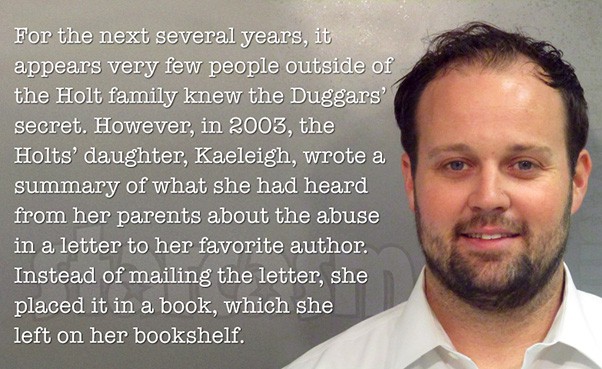The unbelievable way the Josh Duggar molestation scandal leaked to the public

We previously reported that an Arkansas judge has dismissed the lawsuit filed by Jill Dillard, Jessa Seewald, Jinger Vuolo, and Joy Forsythe over the release of the Josh Duggar molestation documents. The judge’s ruling was 20 pages long and it included a very detailed recap of the Josh Duggar molestation scandal, including how the story was initially leaked to family friends.
Below is the whole story from the ruling with only minor edits, including the removal of citations and footnotes.
The Plaintiffs
The Plaintiffs are Jill Dillard, Jessa Seewald, Jinger Vuolo, and Joy Duggar (now Forsythe). They are adult sisters who hail from a very large, religious family. Though they are now married with families of their own, they once shared the last name “Duggar” and lived in a household with their mother, father, and many siblings. This case involves what happened to Plaintiffs when they were children.
From approximately March of 2002 until March of 2003, the Plaintiffs were sexually abused by their brother, Joshua. He was 14 years old when the abuse began and 15 years old when it ended. At the time of the abuse, the Plaintiffs ranged in age from 5 to 11 years old.
The Duggar Parents didn’t report the molestation to the police
Their parents, Jim Bob and Michelle Duggar discovered the abuse but did not report it to the police or any state agency. Instead, they decided to keep it a secret and discipline Joshua privately. Unfortunately, whatever Mr. and Mrs. Duggar tried to do to stop Joshua’s behavior did not work, and by 2003, they turned to their closest friends, Jim and Bobye Holt, for advice and support.
The Holts and Duggars were leaders in their small religious community, which was composed of several families who shared the same beliefs and met at one another’s homes for church services, which they called “gatherings.” Once Mr. and Mrs. Duggar told Mr. and Mrs. Holt about Joshua’s repeated abuse of his sisters, the relationship between the two families became strained.
How a letter hidden in a book exposed the terrible family secret
For the next several years, it appears very few people outside of the Holt family knew the Duggars’ secret. However, in 2003, the Holts’ daughter, Kaeleigh, wrote a summary of what she had heard from her parents about the abuse in a letter to her favorite author. Instead of mailing the letter, she placed it in a book, which she left on her bookshelf.
There the secret remained until 2006, when Kaeleigh loaned the book to a friend and fellow church member. Kaeleigh’s friend found the letter and shared its contents with her parents. From that point on, the Duggars’ family secret spread by word of mouth to the other members of their close-knit church community.
Someone Tipped off the Police
It is unknown exactly how many church members learned of the abuse, but the news caused factions to form within the church, and certain church members evidently disagreed with how the matter was being handled.
On December 7, 2006, the Arkansas Department of Human Services Hotline received two tips that Joshua had molested his sisters. The first tip came from an anonymous caller to the Hotline. The second tip came from Harpo Studios, the producer of Oprah Winfrey’s talk show. It seems the Duggars had caught the attention of the media at around that time because of their unusually large family.
How the Oprah Show helped the investigation
They were scheduled to appear on the Oprah Winfrey Show, and they had traveled to Chicago to record an episode. Harpo Studios received an anonymous email warning that the Duggars were “not what they seem[ed] to be” because Joshua had sexually abused his sisters. Harpo Studios faxed this email to the Arkansas Department of Human Services Hotline, and the same day, Sergeant Darrell Hignite of the Springdale Police Department opened a police investigation into the abuse allegations.
The Duggar Family was interviewed by police in 2006
Joshua was 18 years old at the time, but the Plaintiffs were still minors. Jill, the oldest Plaintiff, was 15 years old, and Joy, the youngest, was 9 years old. Sergeant Hignite contacted Detective Garry Conner of the Washington County Sheriff’s Department to request that the County assist the City in the investigation.
State Police Investigator Whitney Taylor called the Duggars and asked them to bring their children to the Children’s Safety Center in Springdale to be interviewed about the Hotline reports.
According to the redacted copies of the Springdale Police Report and the Washington County Incident Report, the Duggar family arrived at the Children’s Safety Center on December 12, 2006, and Mr. and Mrs. Duggar, Joshua, and the Plaintiffs were interviewed by Investigator Taylor and Sergeant Hignite. Plaintiffs testified in their depositions that these investigators assured them that the contents of their interviews would remain confidential.
The narrative summaries of each interview appear in the Springdale Police Report. Only the summary of the interview with Mr. and Mrs. Duggar appears in the Washington County Incident Report.
According to the Springdale Police Report, after the Duggar family was interviewed, Sergeant Hignite submitted a Family in Need of Services (“FINS”) Affidavit to the Washington County Prosecutor’s Office with instructions to open a FINS case.
On January 10, 2007, the Washington County Prosecutor filed the FINS petition in the Juvenile Court of Washington County under case number J2007-38. Sergeant Hignite’s affidavit and the 33-page Springdale Police Report were attached to the petition and became part of the juvenile court record. No criminal charges were ever brought against Joshua, nor were his sisters removed from the family home.
The Duggar reality empire launched and grew despite the investigation
The following year, 2008, the Duggars began starring in a reality television series called “17 Kids and Counting.” The name of the show was later changed to “18 Kids and Counting” and then “19 Kids and Counting” as the family grew. Once the show began airing nationwide, Mr. and Mrs. Duggar and all their children became minor celebrities.
Nine years after it was first discovered, the story leaked to the press
On May 15, 2015, the City of Springdale and Washington County each received a Freedom of Information Act (“FOIA”) request seeking all files, documents, notes, and recordings mentioning Joshua Duggar, his parents, or any of the addresses where the family had lived over the years. The requests had been sent by an Arkansas attorney named Abtin Mehdizadegan. He was representing a tabloid magazine called In Touch Weekly (though that fact was not revealed in the FOIA request).
Neither the City of Springdale nor Washington County responded immediately to Mr. Mehdizadegan’s request. In fact, both departments lost track of it and did not address it for several days. Under the Arkansas FOIA, governmental agencies typically have three business days to respond to a request.
On May 19, 2015, In Touch Weekly posted a “teaser” article on its website entitled, “‘19 Kids and Counting’ Son Named in Underage Sex Probe.” The identities of Joshua’s victims were not revealed directly or indirectly in the article.
Also on May 19, Chief O’Kelley was first told about Mr. Mehdizadegan’s FOIA request. She obtained a copy of the Springdale Police Report on the Duggar family so she could review it. That same day, Sergeant Hignite of the Springdale Police Department received an email from NBC Universal inquiring about a police report on Joshua Duggar. Sergeant Hignite forwarded the email to Chief O’Kelley. She responded by email at 7:54 p.m., stating, “Oh Good Lord . . . we will soon be in the tabloids!”
Then, at 7:58 p.m., she sent the following email to Springdale Mayor Doug Sprouse:
HERE IS AN INTERESTING TURN OF EVENTS FOR THE DUGGER [sic] FAMILY—WE ARE PREPARING TO REDACT AND RELEASE THE INVESTIGATION BUT THIS IS A NEW TWIST TO THE ORIGINAL REQUEST — NOW WE ARE HEADING TO THE TABLOID NEWS!
Chief O’Kelley also forwarded the email from Sergeant Hignite to separate Defendant Ernest Cate, who was — and still is — Springdale’s City Attorney. Chief O’Kelley asked Mr. Cate to be available to have “a conversation about this” the following day because she was “preparing to release the report . . . .”
On the morning of May 20, 2015, Mr. Cate and Chief O’Kelley met to discuss the FOIA request. Mr. Cate agreed the police report should be released, provided that the names of the juvenile victims were redacted. He did, however, seem to harbor some doubt about his decision — at least initially — because he “proceeded that afternoon to obtain as much legal advice and opinions as was [sic] possible on the FOIA Request.”
He asked Sarah Sparkman, the Deputy City Attorney, for her opinion, and she advised that it would be appropriate to redact the child victims’ names and release the report. Mr. Cate also asked Terra Stephenson, the juvenile prosecutor at the time, and based on what he told her about the case, her opinion was that the report should be released.
Mr. Cate then states he “attempted to contact the Arkansas Department of Human Services” to ask for advice, but no one from that agency called him back that day.
Finally, he placed a telephone call that afternoon to Mark Hayes, the General Counsel of the Arkansas Municipal League. According to Mr. Cate’s memory of the call, he provided Mr. Hayes with “the relevant facts related to the FOIA Request and the SPD Offense Report,” and Mr. Hayes responded that he believed the report would have to be redacted and released — but that he “would look further into the issue.”
Also on May 20th, Chief O’Kelley directed Captain Ron Hritz to reach out to Mr. and Mrs. Duggar and explain to them what was going on with the FOIA request. Captain Hritz did this, but Chief O’Kelley had no direct contact with the Duggars.
At another point on May 20th, Chief O’Kelley telephoned Mr. Mehdizadegan and told him “SPD would need more time to comply” with his request because he sought such a wide variety of records. In response, according to Chief O’Kelley’s declaration, “Mr. Mehdizadegan told [her] that he was only interested in the SPD Offense Report and not with any of the other records which would be responsive to this request.”
City Attorney Cate and Chief O’Kelley then reviewed and redacted the report to make sure the names and ages of all the minors and Joshua had been removed. Mr. Cate states that he and Chief O’Kelley “discuss[ed] that we would prefer to over-redact, rather than to under-redact, the report.”
The pair then learned that Doug Thompson, a local reporter from the Arkansas Democrat-Gazette, had heard about the Duggar police report and was requesting a copy of it under the FOIA. Chief O’Kelley telephoned Mr. Thompson to let him know she was redacting the report and would contact him later.
Just before 9:00 p.m. that same evening, May 20th, Chief O’Kelley emailed a final version of the redacted Springdale Police Report to both Mr. Mehdizadegan and Mr. Thompson. She also sent a copy to Mr. Cate.
At 6:19 a.m. the next morning, May 21st, Mr. Hayes of the Arkansas Municipal League — believing the report had not yet been released — emailed his staff attorneys and directed them to review Mr. Mehdizadegan’s FOIA request and the redacted police report, which he had attached, and advise whether the report should be disclosed under Arkansas law. Attorney Amanda LaFever emailed him back on her way to work at 7:45 a.m., stating she was “[a]t a stoplight” but knew there were laws “protecting the identity of victims of sex crimes.”
By 9:01 a.m., Ms. LaFever had made it to the office, done some quick research, and composed and sent an email to Mr. Hayes advising him that documents that directly or indirectly identified the victim of a sex crime would not be subject to disclosure under the FOIA. Ms. LaFever then forwarded her email to Mr. Cate, who forwarded it to Chief O’Kelley.
Though Chief O’Kelley quickly reached out to Mr. Mehdizadegan to ask that he not use the redacted offense report she had sent him the night before, it was too late. He had already forwarded it to his client. That same morning, at 11:10 a.m., In Touch Weekly posted an online article entitled, “Bombshell Duggar Police Report: Jim Bob Duggar Didn’t Report Son Josh’s Alleged Sex Offenses for More Than a Year.” The article reproduced the 33-page redacted Springdale Police Report.
Also on May 21st, the Washington County Sheriff’s Department first learned of Mr. Mehdizadegan’s FOIA request. Kelly Jensen, whose official title is “Enforcement Secretary,” presented the request to separate Defendant Major Rick Hoyt, who was in charge of responding to such requests on behalf of the Department.
Major Hoyt believed — without consulting the FOIA or any other legal materials — that Washington County’s Incident Report on the Duggars should be disclosed. He admitted in his deposition that he reviewed the unredacted Incident Report for about ten minutes and then asked Ms. Jensen if there had been any arrests in the case. She said no. Then Major Hoyt looked at Joshua’s current age (18) and decided he “didn’t know of anything in the law that would let [him] not release this.”
Major Hoyt’s initial opinion was that the report should be released without any redactions. It appears he thought better of this decision after a while and told Ms. Jensen to “go back and take out the juvenile information,” and then the report would be “good to go.”
Major Hoyt went home that evening without reviewing the final redactions to the report. He had no idea that the same FOIA request had been sent to the Springdale Police Department and that Springdale had already sent a redacted report to Mr. Mehdizadegan.
After Major Hoyt arrived home, he turned on the six o’clock news and saw a report about In Touch Weekly’s publication of the Springdale Police Report. The local news explained that Washington County Juvenile Judge Stacy Zimmerman entered an order that very day expunging the offense report from the public record to protect the identities of the victims.
That prompted Major Hoyt to make a series of phone calls to figure out if the Washington County Incident Report he had ordered released had already been mailed. He (or someone else in the Sheriff’s Department) contacted the 24-hour dispatch unit and directed one of the officers on call to search the outgoing mail bin for the report. Unfortunately, the mail had already been picked up that day, and the bin was empty.
The following day, May 22nd, Judge Zimmerman called the Sheriff’s Department and ordered that the report not be released. But once again, it was too late. Mr. Mehdizadegan received the redacted Washington County Incident Report in the mail on May 27 and forwarded it to his client.
On June 3, In Touch Weekly published a follow-up article entitled, “Josh Duggar Chilling Molestation Confession in New Police Report,” which reproduced the redacted Washington County Incident Report.
In general, the Springdale Police Report was redacted more heavily and more carefully than the Washington County Incident Report. Springdale’s Chief O’Kelley and Mr. Cate redacted all the children’s names and ages (including Joshua’s) from the Springdale Police Report, although they did not redact Mr. and Mrs. Duggar’s names and the family’s home address.
The Washington County Incident Report was shorter than the Springdale Report because it did not contain the interviews of Joshua and the Plaintiffs; however, the Washington County Report contained a summary of the interview of Mr. and Mrs. Duggar—which was not well redacted.
One of the victim’s ages was left unredacted in the Washington County Report; Joshua’s name was disclosed once; and the child victims were variously referred to as Joshua’s “sister[s],” Jim Bob’s “daughter[s],” and, more generally, as “the girls in the family.”
The Springdale Police Report did not include all of these details, but a casual reader of the Springdale Report could, nevertheless, have discerned the following information about the victims:
(1) they were sexually abused on multiple different occasions over the course of a year;
(2) the abuse took place in the Duggar home;
(3) the perpetrator of the abuse was Mr. and Mrs. Duggar’s child, who lived in the home; and
(4) the victims of the abuse were Mr. and Mrs. Duggar’s children, who also lived in the home.
Plaintiffs maintain the publication of these two police reports caused them damage. The original complaint brought a large variety of claims against an array of private and public defendants. In the first round of dispositive motions, the Court winnowed the parties and claims subject to suit. On interlocutory appeal, the Eighth Circuit’s en banc rulings further narrowed the field of claims.
As we now approach the scheduled trial, Plaintiffs are left with three remaining causes of action: invasion of privacy (intrusion upon seclusion), invasion of privacy (public disclosure of a private fact), and outrage. Defendants now seek summary judgment on all counts. Below, the Court will set forth the legal standard used to evaluate motions for summary judgment. Next, the Court will analyze whether Plaintiffs established genuine, material disputes of fact as to each of the three torts. Finally, the Court will consider whether Defendants are entitled to immunity for their actions under state law.
Asa Hawks is a writer and editor for Starcasm. You can contact Asa via Twitter, Facebook, or email at starcasmtips(at)yahoo.com







